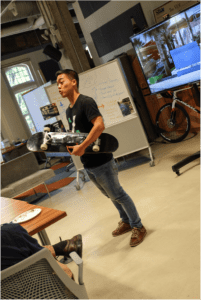
Summer 2016 Hardware Accelerator: Sprint 2 Recap
How do you take an idea from napkin to prototype? The Hardware Accelerator program at Rev: Ithaca Startup Works — now in its second year — is guiding eight teams toward the answer to this question. The program, which kicked off on May 29th, has just finished its second of three design sprints. The culmination will be August 11th at Demo Day, an event where the Rev Hardware Accelerator teams will showcase a summer’s worth of hard work through exhibitions, demonstrations, and pitches.
To conclude Sprint 2 the groups assembled to share, team by team, their stumbles and successes in the past few weeks, as well as their goals for the final sprint. The recap allows the teams to voice their ideas and learn from one another as they strive toward the same goal: improving their products. Several teams recounted a shift in focus, some towards an untapped demographic and others towards a more refined product. “[Sprint 2] allowed us to really spend time developing a working prototype,” says Hunter Hartshorne, a member of the Hillside Hydro team. Hillside Hydro is working to develop a microhydroelectric generator – in other words, a water-powered generator that provides portable charging to more remote outdoor areas. At the recap, Hunter presented a 3D-printed model to the group that he and his partner plan to use in Sprint 3 to get customer feedback.
Validation from customers is an important part of proof of concept, the task emphasized in Sprint 2, as it produces concrete evidence that teams have an idea that fits a need. Hardware Accelerator team The Clock Guys spent considerable time garnering customer feedback during the second sprint; their product is an electronic clock designed to allow parents and children to manage time and tasks together. Zach Leidig, who presented the team’s findings at the recap, reported verification that a need exists…though not exactly in the way the team had anticipated. They imagined that the clock would be most useful to parents with children who are non-neurotypical, such as autism-spectrum disorders, or who have a learning disability. Instead, The Clock Guys found that the distinction wasn’t valid in this case – customer research indicated that all parents seemed to have an equally difficult time corralling their children to complete chores. “It’s been really helpful,” Leidig says of their customer validation process. “I think our product vision changed as we realized that our clock could do a lot of different things.” The Clock Guys plan to introduce a prototype to their potential customers in Sprint 3 to test how children interact with the clock.
Other teams sought out feedback from a different source: the daily users of Rev’s coworking space. The FlexIt team, who are creating a fitted ergonomic glove to combat RSI and wrist pain for those with typing-intensive jobs, asked that people try out their product by wearing the glove during the workday and assessing its comfort and usability. Remote Science’s Joe Chipalowsky, who is working toward developing a web-based furnace monitoring system for homeowners, also requested help with one of his next steps: coming up with a product name.
Processes like brainstorming and branding are where Hardware Accelerator program instructors come in; their advice and business acumen combine to help move the teams along, providing the knowledge base for these growing startups. During the Sprints, the instructors lead workshops about relevant topics and meet privately with the teams as needed. Also on hand are Rev’s Entrepreneurs-in-Residence, who guide the teams through building a business model and conducting customer research.
The Hardware Accelerator also brings in experts from various industries, holding events featuring business pros that can speak to the challenges the team faces during each sprint. During Sprint 2, former Rev Hardware Accelerator participant Micah Green held a Skype call with the teams to talk about the timeline of his own startup, Maidbot, and answer team questions. Also included in Sprint 2 was a session with Aaron Walls of Brewjacket, a local company that produces special cooling devices for home-brewers. Walls centered his talk on raising Kickstarter funds, which several of the teams who are looking to take their product to the next level found particularly helpful.
At the Sprint 2 recap, Jeffrey Ly, who is part of the X-Board team, held up a black skateboard and grinned at the room. The team is producing a skateboard with special capabilities designed for trick – in contrast, Jeffrey notes, to regular skateboard, whose main capacity is transportation. Ly shared that Sprint 2 helped him fine-tune his design possibilities, ruling out some of their original blueprints. “We took a deep dive into the design aspect, to see what was feasible,” Jeffrey reports. He goes on to explain that in Sprint 3, his team will work to make the product fit neatly into a standard skateboard. “You’ll see this same skateboard, but you won’t see the battery pack. It’s always about pushing the boundaries, because that’s what skateboarding is all about.”
The final Sprint will hone in on prototyping, getting the teams ready to show their products to the public on Demo Day. Hardware Accelerator instructor Xanthe Matychak, industrial designer and tech expert, reflects on the teams’ work in the last few weeks. “The end of Sprint 2 is an exciting moment in the program,” she says. “The vast amount of work the teams have done interviewing customers, prototyping electronics, and printing custom parts puts them in an excellent position for the final sprint towards Demo Day.”
Stay tuned for updates about Sprint 3 and upcoming profiles of all the HA teams. You can also check out our Twitter and Instagram accounts for more photos of the Sprint 2 recap. For more information on Rev: Ithaca Startup Works and the Hardware Accelerator Program, sign up for our newsletter or email us [email protected]



